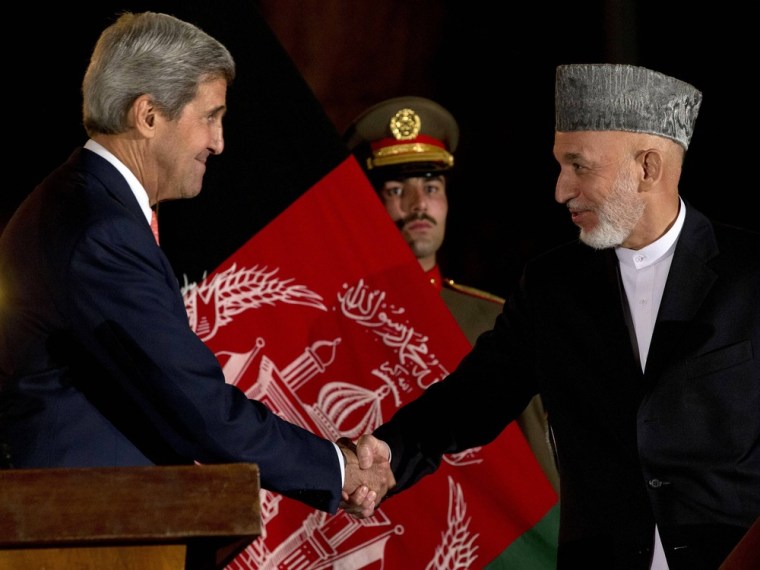Secretary of State John Kerry said Saturday that the major issues related to a security agreement with Afghan President Hamid Karzai had been resolved as he wrapped up an unannounced trip to Afghanistan -- but that the issue of immunity for American troops is still to be decided by a council of elders and leaders.
“We have resolved in these last 24 hours the major issues that [Karzai] went through. We have resolved those issues,” Kerry said. “And we have put ourselves in a position for an enduring partnership going forward in the years ahead, providing that the political process of Afghanistan accepts that.”
Kerry added: “We respect completely the president’s need, the president’s right, the Afghan people’s need to approve of whatever agreement might come forward.”
The focus of Kerry's trip to Afghanistan has been the Bilateral Security Agreement, which will delineate the proposed U.S. military presence in Afghanistan after their scheduled withdrawal at the end of 2014. The deadline for finalizing the agreement looms at the end of October.
Negotiations between Kerry and Karzai dragged on and even led the secretary to delay his departure by several hours to hammer out a deal.
The U.S. is demanding to try American citizens who break the law in Afghanistan at home in the United States.
The security agreement has been under negotiation for more than 11 months, and could potentially keep as many as 10,000 U.S. troops after 2014.
The two major points of contention between the two sides were how much authority and autonomy U.S. troops would have as they stay on in Afghanistan, and whether the United States would come to Afghanistan's defense if the country was attacked. The Afghan government rejected an initial U.S. proposal on immunity earlier this year.

The United Nations Security Council voted on Oct. 11 to extend the NATO-International Security Assistance Force presence in Afghanistan until Dec. 31, 2014.
"Our main concern is the respect for national sovereignty," Karzai said Saturday at the joint news conference with Kerry at the presidential palace in Kabul.
"The U.S. has committed to stand by the side of Afghanistan if it is attacked," Karzai added. "But when artillery was fired on our territory, the U.S. was not on our side."
"So, we have to be clear about the definition of invasion. Whether it is having boots on the ground or violating our sovereignty," Karzai said.
There are currently an estimated 87,000 international troops in Afghanistan, including about 52,000 Americans, according to The Associated Press.
Earlier this week, Karzai complained about the conduct of foreign forces, alleging that the U.S. and NATO had caused pain to the Afghan people and violated the country's sovereignty.
"The most important thing for us is the protections of lives and property of Afghans who have been victims of the war on terror," Karzai said Saturday.
The United States hopes to maintain a presence of as many as 10,000 troops to pursue the remnants of al Qaeda in the country -- but if no agreement is signed, the U.S. military contingent would have to leave at the end of next year.
NBC News' Wajahat S. Khan and Catherine Chomiak contributed to this report. The Associated Press and Reuters also contributed.
Related: